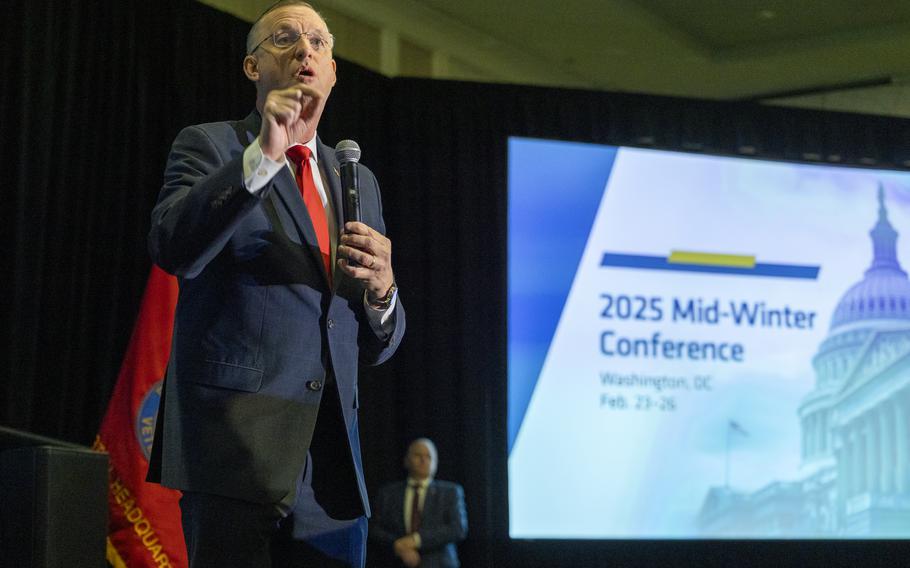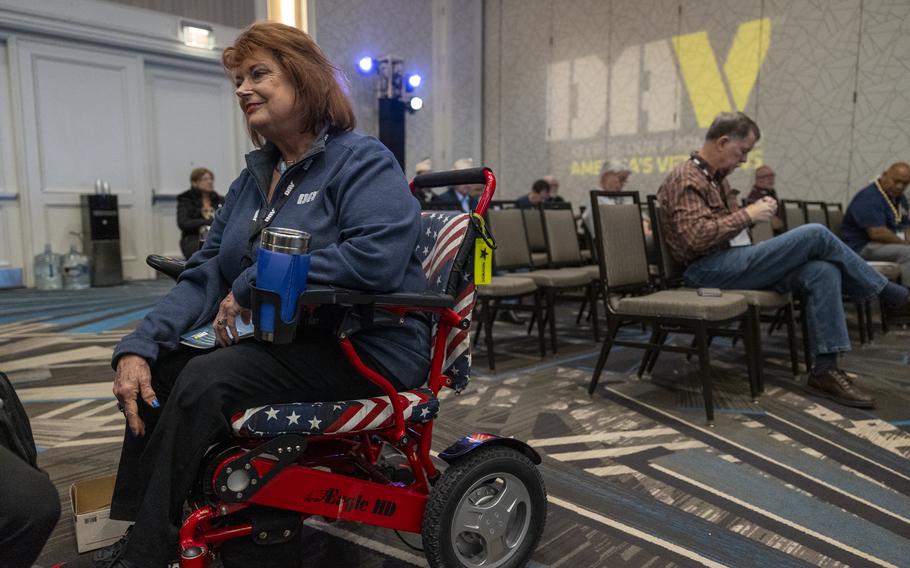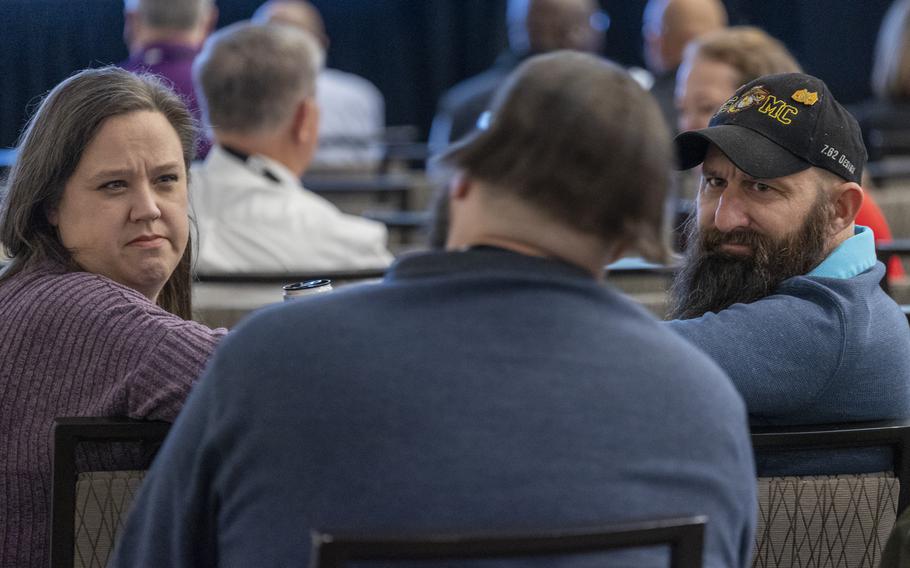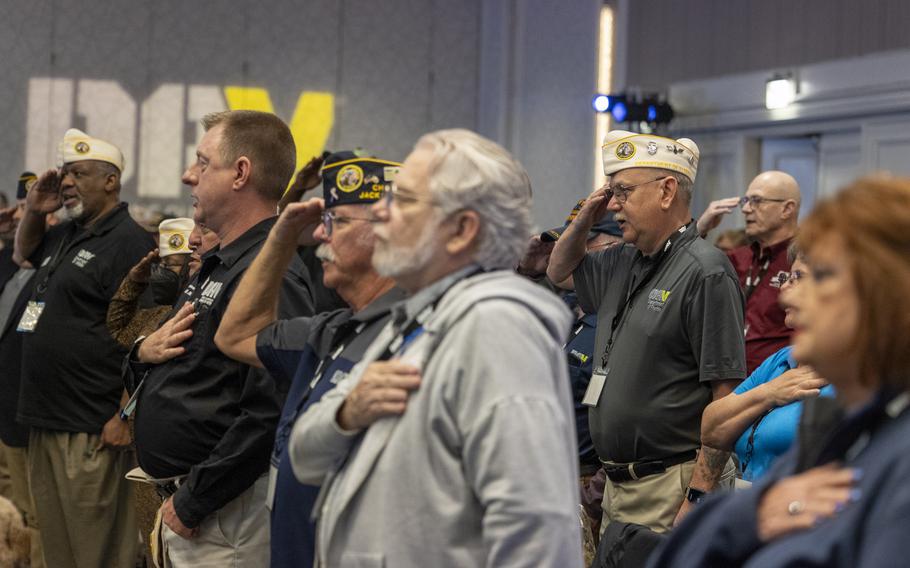
VA Secretary Doug Collins speaks Sunday, Feb. 23, 2025, at the Disabled American Veterans’ 2025 Mid-Winter Conference in Arlington, Va. (Eric Kayne/Stars and Stripes)
ARLINGTON, Va. — Army veteran Brenda Reed, whose wheelchair was adorned with a handmade red-white-and-blue backrest, was difficult to miss among the hundreds of veterans attending the Disabled American Veterans’ winter conference at a hotel convention center just across the Potomac River from the nation’s capital.
As Doug Collins, the new secretary of the Department of Veterans Affairs, strode to the podium as special guest speaker opening the conference Sunday, Reed positioned herself in the crowded auditorium for a clear view and to take notes as Collins delivered his first public remarks to the DAV.
Reed, a 68-year-old former sergeant, said she wanted to make certain the concerns of amputees such as herself are known to leaders at the VA and the DAV, one of the nation’s largest veterans advocacy groups with more than 1 million members.
“Last year the budget was cut for prosthetics,” said Reed, who pulled up her pant leg to reveal an artificial limb. “I don’t want to see a repeat of that this year.”

Army veteran Brenda Reed of Florida attends a meeting on Sunday, Feb. 23, 2025, at the Disabled American Veterans’ 2025 Mid-Winter Conference in Arlington, Va. (Eric Kayne/Stars and Stripes)
Many veterans such as Reed arrived at the four-day conference with their own wish lists and agendas. But they all shared an interest in protecting and sustaining VA benefits that provide critical support for veterans with disabilities.
Their message was one that Collins — who has been on the job for two weeks — pledged to uphold during a half-hour speech.
“My priorities are pretty simple. No veteran should have to get outside help to get the very benefits they’ve earned through service,” said Collins, a military chaplain, lawyer and former Georgia congressman. “I have said this before, and I say it again here: The idea that the veteran has to call a congressman or a senator to get help with the benefits they’ve eared means the VA has failed.”
The VA delivered more than $30 billion in services and benefits to veterans in fiscal 2024, which span health care, disability compensation, tuition assistance and pensions. But timely access to earned care and services is not optional but required by law for eligible veterans, the secretary said.
Collins told the packed auditorium that he is paying close attention to how taxpayer money is spent by the VA. He said $14 million will be redirected to veterans services that was supporting programs for diversity, equity and inclusion, which President Donald Trump just ended.
Collins said he also is reviewing contracted service to make certain programs are necessary, relevant and helpful to veterans.
.jpg/alternates/LANDSCAPE_910/20250223_VA_Collins_DAV_0320%202.jpg)
VA Secretary Doug Collins shakes the hand of an attendee on Sunday, Feb. 23, 2025, at the Disabled American Veterans’ 2025 Mid-Winter Conference in Arlington, Va. (Eric Kayne/Stars and Stripes)
With more than half of former service members older than 65, the VA also must increasingly manage rising costs to meet the demand for services as they age. VA spending per veteran increased from about $4,300 in 2005 to an inflation-adjusted $14,400 in 2022, according to USA Spending, a federal government portal that examines spending by agency. The increase was largely attributed to the higher needs of veterans as they age, according to USA Spending.
Reed, for example, said she will continue to push lawmakers for more funds for medical devices to help disabled veterans as well as for hearing aids, eyeglasses, canes, blood pressure monitors and other equipment older veterans often require.
“I’m trying to get younger vets more interested and engaged with the DAV,” said 39-year-old Ross LaCourt, a former Marine Corps gunnery sergeant who traveled from Minnesota with his wife, a Navy veteran, to attend the conference. “Look around. There are a lot of older veterans here. I want to see younger veterans discover the advocacy we get from veterans service organizations like DAV.”
LaCourt said he retired from military duty in 2023, a year before he reached 20 years of service due to medical problems. He said he would like to see the VA improve employment assistance for service members who are transitioning to civilian life and seek to embark on new careers.
“The programs I went through as I was preparing to leave the service turned out to be a waste of time, energy and effort,” he said. “Everything was explained in a shotgun blast that was hard to fathom.”
If veterans understood better how to navigate their lives after the military, homelessness and suicides would decrease, LaCourt said.

Navy veteran Marissa LaCourt, left, and Marine Corps veteran Ross LaCourt of Minnesota speak with another attendee on Sunday, Feb. 23, 2025, at the Disabled American Veterans’ 2025 Mid-Winter Conference in Arlington, Va. (Eric Kayne/Stars and Stripes)
His wife, Marissa LaCourt, also 39, is a Navy veteran who works as a veterans service officer in Goodhue County, Minn. A priority for her is reforming the processing of veterans’ claims for disability compensation to ensure timely benefits.
LaCourt said she sees veterans’ medical exams for diagnosing and confirming a disability often repeated because they were conducted incorrectly or are incomplete.
The exams are done through doctors contracted with the VA.
“Some of the medical exams are frankly not that good. I often have to send the veteran back for three or four exams, which adds to the costs,” she said. “That’s a big problem.”
Bill Plunk, 69, of Arkansas, who arrived and took a seat early to hear Collins’ talk, said he would like to see better health care options for women who are veterans.
“It is important for the VA and for Congress to get up to speed in addressing the needs of women veterans,” said Plunk, a former master chief who served for 25 years in the Navy Reserve. Plunk said he believes more tailored care for female veterans would decrease their risk of suicide.
Female veterans are twice as likely to attempt suicide than male veterans and about twice as likely to die by suicide than women who never served in the military, according to a 2024 DAV report.

Attendees recite the Pledge of Allegiance on Sunday, Feb. 23, 2025, at the Disabled American Veterans’ 2025 Mid-Winter Conference in Arlington, Va. (Eric Kayne/Stars and Stripes)
In his address to veterans, Collins — a colonel and chaplain in the Air Force Reserve — acknowledged the enormous task of the VA in offering care and support for the nation’s 18 million veterans. But he also pledged to make veterans’ needs, not the bureaucracy, his primary focus.
Collins completed a deployment to Iraq in 2008 with the 94th Air Wing at Dobbins Air Reserve Base in Marietta, Ga. He also served as a chaplain in the Navy for two years in the late 1980s.
Introducing himself as the son of a Georgia state trooper, Collins told the crowd that he would not forget his roots.
“Once you get accustomed to Washington, sometimes you forget where you came from, which for most of us is outside the beltway,” he said. “As my grandma used to say, ‘Common sense ain’t that common around here’.”
Collins also said he is a hands-on leader who will work each day to improve the VA’s effectiveness and efficiency.
Collins said he surprises the rank-and-file staff at VA headquarters in Washington, when he strolls through the office to see operations firsthand and make his presence known.
“I am not a secretary of the VA willing to just sit behind a desk. As an old Baptist preacher, I like to get out and meet people. When I walk around the VA facility, I don’t think they’ve ever seen anything like this. I get looks and comments. People ask, ‘Who are you?’” Collins said.